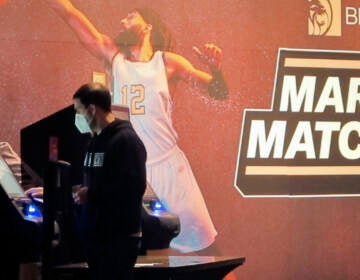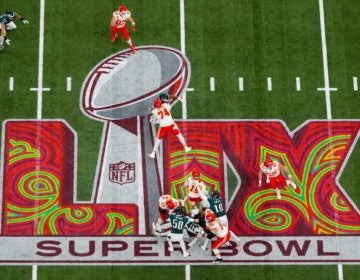Major leagues, broadcasters pledge responsible betting ads
The Coalition for Responsible Sports Betting Advertising consists of the NFL; Major League Baseball; the NBA and WNBA; the NHL, Major League Soccer and NASCAR.

A customer makes a sports bet at the Ocean Casino Resort in Atlantic City, N.J., Sept. 6, 2022. Most of the nation's major professional sports leagues, plus the FOX media company are creating an alliance to ensure that sports betting advertising is done responsibly and does not target minors, it was announced Wednesday, April 19, 2023. (AP Photo/Wayne Parry)
Most of the nation’s major professional sports leagues, plus the media companies Fox and NBCUniversal are creating an alliance to ensure that sports betting advertising is done responsibly and does not target minors.
The Coalition for Responsible Sports Betting Advertising was created Wednesday, consisting of the National Football League; Major League Baseball; the men’s and women’s leagues of the National Basketball Association; the National Hockey League; NASCAR, Major League Soccer, Fox and NBCUniversal.
They described the group as a voluntary alliance to control how sports betting advertising, which is ever-present on the airwaves, in print and online, is presented to consumers.
It includes a recommendation that “excessive” advertising be avoided.
Formation of the group follows a move last month by the commercial casino industry through its national trade association, the American Gaming Association, to adopt a new responsible sports betting marketing code.
Both efforts recognize the proliferation of sports betting advertising in the five years since the U.S. Supreme Court cleared the way for any state to offer legal sports wagering.
They also have a clear, if unstated goal: to regulate their own advertising before the government might step in and do it for them. One New York congressman has introduced legislation that would ban all online and digital sports betting advertising, and others have called for government-imposed regulation of sports betting ads.
“As the legalization of sports betting spreads nationwide, we feel it is critical to establish guardrails around how sports betting should be advertised to consumers across the United States,” the group said in a joint statement. “Each member of the coalition feels a responsibility to ensure sports betting advertising is not only targeted to an appropriate audience, but also that the message is thoughtfully crafted and carefully delivered.”
David Schwartz, a gambling historian at the University of Nevada Las Vegas, said the prosects for government control of sports betting ads are uncertain.
“I can see how it would be in the leagues’ and operators’ best interests to avoid formal federal oversight,” he said. “Advertising is an area that touches not just customers, but the public at large. As such, it may have more visibility than even the actual business of taking bets. It is understandable that those involved want to get out in front of this.”
Speaking Wednesday at a gambling industry forum in Atlantic City, West Virginia state Delegate Shawn Fluharty said there is definitely concern among state lawmakers over the frequency of sports betting advertising.
“If you’re talking to any people out there, they’re probably a little tired of seeing Jamie Foxx on TV,” he said, referring to the actor’s widely broadcast ads for BetMGM’s sportsbook.
He said the coalition is a good idea that also shows that the leagues recognize there is cause for concern about the possibility of government intervention regarding sports betting advertising.
The group has several core principles, including that sports betting should be marketed only to adults of legal betting age; that the ads should not promote irresponsible or excessive gambling; they should be in good taste and not be misleading; and that publishers of sports betting advertising should have strong internal reviews and should take seriously complaints from consumers about such advertising.
Kenny Gersh, executive vice president of media and business development for Major League Baseball, called the group “another important step for our industry as legal sports betting continues to grow.”
Sports betting is currently legal in 33 U.S. states, plus Washington D.C.
“While providing new fan engagement opportunities to enjoy our sport in more ways, we have to continue to be mindful and deliberate with how these sports betting options are presented and to whom they’re directed,” Gersh said. “Layering this coalition’s work in the advertising arena on top of our efforts to promote responsible gambling and address problem gambling challenges will lead to more thoughtful planning and implementation across the board.”
David Highhill, general manager of sports betting for the NFL, said the leagues recognize advertising as an important component of responsible conduct.
“Legalized sports betting offers fans another way to engage with their favorite sports, but just as we must support problem gambling prevention and resourcing, we must also remain mindful of how sports betting is presented and advertised to consumers, and this coalition should greatly aid in that cause,” he said.
Mike Mulvihill, an executive vice president with Fox Sports, said, “We are committed to providing fans a responsible and ethical engagement with sports betting, keeping the integrity of the games and our broadcasts at the forefront at all times.”
Keith Whyte, executive director of the National Council on Problem Gambling, praised the group for “taking steps to lead the industry in proactive change to protect consumers.”
WHYY is your source for fact-based, in-depth journalism and information. As a nonprofit organization, we rely on financial support from readers like you. Please give today.





